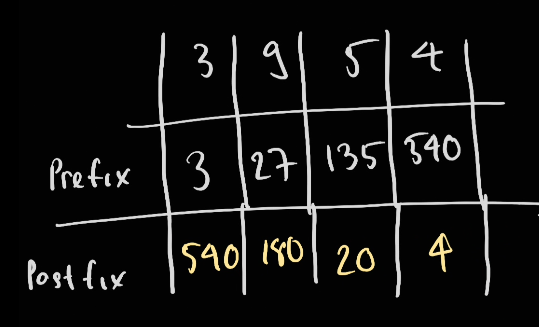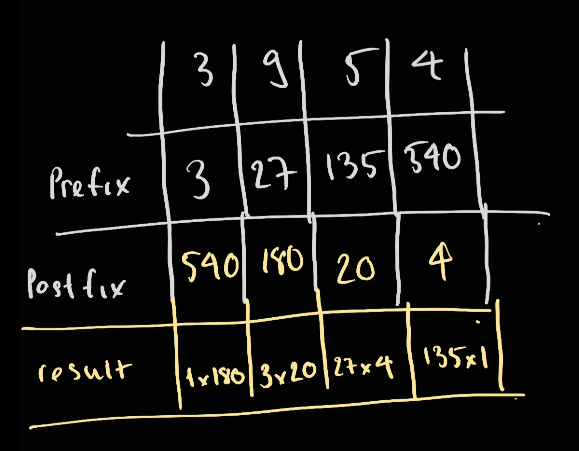PrefixPostFix Product
Problem statement
Problem: https://leetcode.com/problems/product-of-array-except-self/description/
Given an integer array nums, return an array answer such that answer[i] is equal to the product of all the elements of nums except nums[i].
The product of any prefix or suffix of nums is guaranteed to fit in a 32-bit integer.
You must write an algorithm that runs in O(n) time and without using the division operation.
Example 1:
Input: nums = [1,2,3,4]
Output: [24,12,8,6]
Example 2:
Input: nums = [-1,1,0,-3,3]
Output: [0,0,9,0,0]
Solution
The trick is to calculate the prefix and the postfix of of each number.
- : The product of all numbers before (inclusive)
- : The product of all numbers after (inclusive)
And if we want to have the product without . We have the formula:
For example with these number [3,9,5,4] we have the following table:

Explaination:
=
=
=
=
Therefore, for example to calculate the product of without 9 we can take prefix(3) - product of all numbers before 9 - and times with postfix(5) - product of all numbers after 9.
For those number that's out of the range for postfix and prefix, we intialise it to 1.
As a result, we have the following answer:

Therefore:
[180, 60, 108, 135]
Implementation
from unittest import TestCase, main
from typing import *
from collections import deque
class App:
def productExceptSelf(self, nums: List[int]) -> List[int]:
if len(nums) < 2: return nums
beforeCurrentNumberProduct = []
lastProduct = 1
for num in nums:
lastProduct *= num
beforeCurrentNumberProduct.append(lastProduct)
afterCurrentNumberProduct = deque()
lastProduct = 1
for i in range(len(nums) - 1, -1, -1):
lastProduct *= nums[i]
afterCurrentNumberProduct.appendleft(lastProduct)
result = [1] * len(nums)
for i in range(len(result)):
result[i] = self.getProduct(i - 1, beforeCurrentNumberProduct) *\
self.getProduct(i + 1, afterCurrentNumberProduct)
return result
def getProduct(self, index: int, productArray: List[int]) -> int:
if index < 0 or index >= len(productArray):
return 1
return productArray[index]
Time complexity: O(n)
Space complexity: O(n)
Optimisation
As you have notice, we can properly store the result of prefix and postfix into a variable and calculate it on the fly. So that we can reduce our space to O(1).
class App:
def productExceptSelf(self, nums: List[int]) -> List[int]:
if len(nums) < 2: return nums
result = [1] * len(nums)
currentPrefixProduct = 1
for i, num in enumerate(nums):
result[i] = currentPrefixProduct
currentPrefixProduct *= num
currentPostfixProduct = 1
for i in range(len(nums) - 1, -1, -1):
num = nums[i]
result[i] *= currentPostfixProduct
currentPostfixProduct *= num
return result
currentPrefixProduct is for accumulating the product before result[i]. Because of that result[i] should store 1 result behind
currentPostfixProduct is for accumulating the product after result[i]. Because of that we need to calculate the currentPostfixProduct first before times it to result[i]
Time Complexity:
Space Complexity: